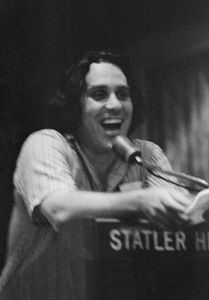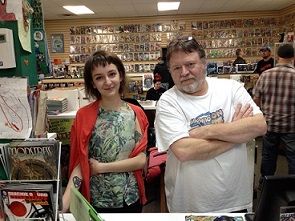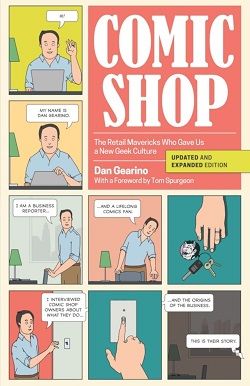First Comics News: Why did you decide “Comic Shop” was an important book for you to write?
Dan Gearino: I wanted to read this book, and it didn’t exist. More specifically, I wanted to read several books, one about the history of comic shops as a business, one about the current culture of comic shops and one with a rundown of notable comic shops and people behind them. I am a reporter by day, and I often have to figure out how to describe complex events and systems, usually on tight deadlines. This background meant that I had a lot — perhaps too much — of confidence that I could dive right in and write something that combined this history and culture of comic shops. It was only after I started that I realized the high degree of difficulty. I think, and I hope, that my book will help to sketch some of the contours of this subject, and that others will follow with their own explorations, whether that is a memoir from someone who is in the business (I’m looking at you, Brian Hibbs, and others), or a more academic look at the role of comic shops in comics culture, or even a purely fan-oriented look at the best shops.

1st: Which three people have been the most influential in creating comic shops in your opinion and can you tell us why in one sentence?
Dan: Two immediately come to find: Phil Seuling was a convention organizer and high school teacher who went on to co-found the first distributor of mainstream comics to comic shops. Steve Geppi was a highly successful comics retailer in Baltimore who become owner of a comics distribution business and, through hard work and good luck, built it into the company that is now the exclusive supplier of most mainstream comics to comic shops. After those two, there is a long list of people who made major contributions, including great and successful retailers and others who weren’t necessarily successful but who pioneered certain practices that turned out to be influential.
1st: Is this a book that will appeal to everyone or only a select group of people?
Dan: I wrote this imagining how it would read to someone who was not a comics fan, but I realize that the core audience is fans and the retailers themselves. It’s been gratifying to hear from people who enjoyed the book but are not big comics fans.
1st: Which part of “Comic Shop” stands out the most for you?
Dan: I think the soul of the book is in the chapters that take place at Laughing Ogre, the Columbus comic shop where I am a regular customer, and which I use as a jumping-off point to talk about larger issues in the business. The story of that store says so much about the challenges and rewards of running a comic shop and of being a customer there. At the same time, story of the origins of modern comic shops has its own resonance. I’ve heard from readers that they were moved by the story of the life and death of Phil Seuling and other elements of the history of the industry.

1st: Who was most influential in your writing of this book?
Dan: The most important was probably Gib Bickel, co-founder and manager of the Laughing Ogre. He helped me get started by sharing his contacts and being willing to tell me his story. Next, probably, was Jim Hanley, the former New York retailer, who generously gave me his time and his unvarnished recollections of the best and worst days of his life.
1st: What does Geek Culture mean?
Dan: I think of geek culture as an umbrella that includes comics and science fiction and fantasy media in all of their forms. It includes a camaraderie that stems from a time when those things were largely outside of the cultural mainstream. And now, when seemingly everyone watches Doctor Who and certain elements of comics culture are very much in the mainstream, I think we’re figuring out what geek culture means, and how it’s changed.
1st: Do you have any more books planned for the future?
Dan: I have many ideas. At this point, I’m not working on a follow-up. I can see writing more about comics, and I have many interests beyond comics.

1st: What does a writer need to do to be a good writer?
Dan: One of my first newspaper editors used to talk about how he was still learning how to write clearly after 30 years in the business. I think that kind of attitude is at the core of doing good work — constant growth and improvement, and the realization that writing is hard.
1st: What is the most rewarding experience you have had from writing?
Dan: I write for a living, so it’s really difficult for me to single out one thing, or even a dozen things.
1st: Have you ever had writers block and i so how did you get over it?
Dan: For reporters who work on deadlines, writer’s block simply cannot happen. There are plenty of times when it’s difficult to do the work, but you just need to plow through and start typing. An essential element is realizing that the first thing you write may not be any good. It may just be a step toward the thing that is good
1s t: How does your writing for “Clean Economy Weekly” compare to writing “Comic Shop”?
t: How does your writing for “Clean Economy Weekly” compare to writing “Comic Shop”?
Dan: For my clean energy newsletter, most of the interviews are short and focused. The writing takes place over about a day and a half. On a long form work, the interviews go on for hours at a time, and many sessions with the same people. This means that the writing process involves sifting through voluminous interview notes and figuring out what to use. It’s the difference between a sprint and a marathon.
1st: Do you think comic shops will be around forever in one form or another?
Dan: I think there will be brick-and-mortar stores selling old comics for the rest of my lifetime, at least. I think every metro area will have a few of these stores. I’m less sure about how comic shops will evolve in selling new material. I think the best comic shops have life in them, but the ways in which we consume media are changing, and it remains to be seen how comic shops will adapt to that.
1st: Any words for your readers?
Dan: Thanks for reading!
